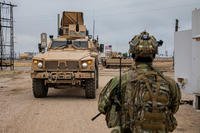As of Feb. 20, more than 2,500 veterans suffering from traumatic brain injury (TBI) and/or post-traumatic stress disorder (PTSD) have participated in The American Legion's online survey that seeks to determine the effectiveness of treatments for these two conditions.
During the Legion's month-long survey, the Institute of Medicine (IOM) released a report on Feb. 13, "Gulf War and Health: Long-Term Effects of Blast Injuries," that examines how blast exposure increases the likelihood of developing TBI, PTSD and other long-term health ailments among veterans of the Iraq and Afghanistan wars.
The American Legion welcomed IOM's report as a much-needed study that will help to determine what research is needed in the area of long-term health problems caused by blast injuries.
Dr. Jeff Greenberg of Data Recognition Corporation (DRC), which helped the Legion develop its current survey, said the IOM report "is a critically important document" with findings that indicate "there is precious little information about the effects of blast exposure over the long term.
"This is unsurprising. Blast exposure is a highly complex phenomena. Findings of the report indicate the need for greater resources to address this health challenge."
Similarly, Greenberg said, the online survey The American Legion and DRC are conducting attempts to address gaps in the scientific understanding of veterans' health-care experiences who have been exposed to psychological or head trauma.
With the information currently being collected from veterans by the Legion, Greenberg said, "The hope is that this information will lead to a more pronounced understanding of services received, aimed at supporting the goal of improved quality of care and better standardization of care."
The Department of Veterans Affairs (VA) requested IOM to conduct the study and is reviewing the report to determine whether any changes to its health-care policies need to be made.
Recommendations for VA from the report include to:
- Create a database to link Department of Defense (DoD) records for troops with blast-related injuries to VA health records in order to facilitate long-term health care needs.
- Create a blast-injury registry to serve as a foundation for long-term studies of blast-exposed veterans.
- Develop clinical practice guidelines for blast-related injuries other than PTSD and TBI.
- Encourage health-care providers to ask veterans the question, "Have you been exposed to a blast?"
- The report also recommends that DoD develop and deploy data-collection technologies that measure blast components and their characteristics in real time.
"In the case of veterans with PTSD and TBI," Greenberg said, "there should be little doubt about the importance of continued research efforts aimed at improving health care, and ultimately long-term health outcomes, for those who have so nobly served this nation. Scientists, practitioners and those who would serve veterans are not at the end of the journey. Rather, there is a long distance to travel."
Long-term health effects from blast injuries include cardiopulmonary and cardiovascular function, substance-abuse disorders, chronic pain, long-term hearing damage, and muscle or bone impairment such as osteo-arthritis.
Since 2001, about 3,000 servicemembers have been killed and 32,000 have been wounded by blasts from improvised explosive devices.
The American Legion created a committee to research treatments for TBI and PTSD that are being used by VA, DoD and the private sector. It issued a report on its findings and recommendations, "The War Within," in September 2013.
The Legion's current online survey is the latest initiative in its continuing research on treatments and therapies for TBI and PTSD.










